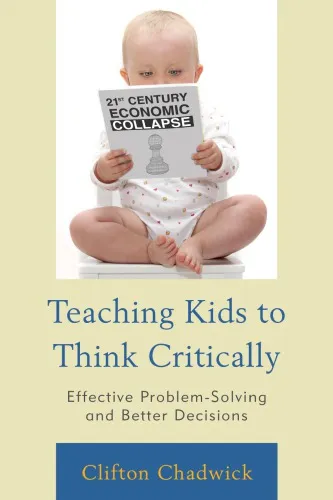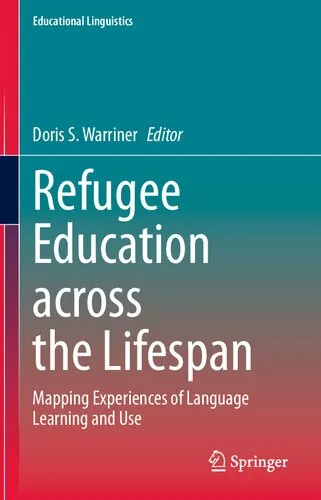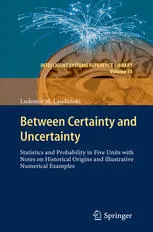Teaching Kids to Think Critically: Effective Problem-Solving and Better Decisions
4.0
بر اساس نظر کاربران

شما میتونید سوالاتتون در باره کتاب رو از هوش مصنوعیش بعد از ورود بپرسید
هر دانلود یا پرسش از هوش مصنوعی 2 امتیاز لازم دارد، برای بدست آوردن امتیاز رایگان، به صفحه ی راهنمای امتیازات سر بزنید و یک سری کار ارزشمند انجام بدینکتاب های مرتبط:
معرفی کتاب "Teaching Kids to Think Critically: Effective Problem-Solving and Better Decisions"
کتاب "Teaching Kids to Think Critically: Effective Problem-Solving and Better Decisions" نوشته کلینتون چادویک، یک راهنمای ارزشمند برای والدین، مربیان و هر کسی است که در تربیت نسل جوان نقش دارد. این کتاب با تمرکز بر پرورش تفکر انتقادی و مهارتهای حل مسئله در کودکان، نشان میدهد که چگونه میتوانیم ابزاری فراهم کنیم تا فرزندانمان تصمیمات بهتری در زندگی بگیرند.
خلاصهای از کتاب
در این کتاب، نویسنده به طور دقیق به این مسئله میپردازد که چرا تفکر انتقادی یکی از مهمترین مهارتهایی است که باید به کودکان آموزش داد. در دنیایی که همیشه پر از چالشهای پیچیده است، توانایی تحلیل شرایط، یافتن راهحلهای منطقی و تصمیمگیری اصولی بسیار ضروری است. نویسنده با استفاده از مطالعات روانشناختی و آموزشی، توضیح میدهد که چگونه میتوان مفاهیمی همچون critical thinking، problem-solving، و تحلیل دادهها را به کودکان آموزش داد.
کتاب به روشنی چارچوبهایی را برای والدین و معلمان ارائه میدهد تا از طریق آن، توانایی تفکر احساسی و منطقی کودکان را توسعه دهند. در حالی که بسیاری از کتابها به موضوعات مشابه میپردازند، این اثر با ارائه دستورالعملهای کاربردی، تمرینهای عملی و مثالهای روزمره به این موضوع رویکردی خاص و جامع دارد.
نکات کلیدی از کتاب
- چرا آموزش تفکر انتقادی از سنین پایین ضروری است
- چگونگی ایجاد تعادل میان تفکر احساسی و منطقی
- پنج گام مؤثر برای حل مسئله با روشهای ساده اما تأثیرگذار
- نقش والدین در هدایت فرزندان به سمت تصمیمگیری بهتر
- مثالهای واقعی و فعالیتهای تعاملی برای آموزش مهارتهای problem-solving
نقلقولهای معروف از کتاب
"توانایی پرسیدن سوالات درست، کلید درک مسائل پیچیده و یافتن راهحلهای پایدار است."
"تفکر انتقادی نه تنها به مقصد دستیابی کمک میکند، بلکه مسیری را میسازد که فرزندان شما بتوانند در سراسر زندگی با اعتماد به نفس در آن حرکت کنند."
چرا این کتاب مهم است؟
با توجه به سرعت تغییرات اجتماعی، فناوری و فرهنگی، آموزش تفکر انتقادی به کودکان بیش از هر زمان دیگری ضروری به نظر میرسد. این کتاب به والدین و مربیان راهحلهایی در دنیای واقعی ارائه میدهد تا به کودکان کمک کنند در برابر چالشهای مختلف آماده باشند و اعتماد به نفس بیشتری در تصمیمگیریهای خود پیدا کنند.
از دیگر مزایای این کتاب میتوان به این اشاره کرد که خواندن آن نیازی به تخصص خاصی ندارد و مفاهیم آن به زبانی ساده و قابل درک توضیح داده شدهاند. پیام اصلی کتاب این است که اگر بتوانیم به کودکان ابزارهای لازم برای تفکر مستقلانه و مؤثر را ارائه دهیم، آینده روشنتری خواهیم داشت.
Introduction
In today’s fast-paced and ever-evolving world, the ability to think critically is not just an advantage but a necessity. Education systems across the globe often emphasize rote learning, memorization, and the regurgitation of facts. While those methodologies have their place, they fall short of equipping children with the lifelong skills they need to analyze problems, make sound decisions, and adapt to change. Teaching Kids to Think Critically: Effective Problem-Solving and Better Decisions dives into this very subject, providing parents, educators, and caretakers with the tools and strategies needed to nurture critical thinkers who excel in life's many complexities.
As a comprehensive guide, this book is designed to empower adults to teach children how to approach problems methodically while encouraging creativity, empathy, and logical decision-making. It bridges the gap between theory and practice by providing actionable steps and real-world scenarios that make critical thinking accessible to learners of all ages. Whether you're a parent striving to improve your child’s cognitive skills or an educator aiming to create a more engaging classroom environment, this book serves as your go-to resource.
A Detailed Summary of the Book
The book begins by defining critical thinking and its importance in modern life, emphasizing that it goes beyond academic success. It highlights how critical thinking skills are crucial for making ethical decisions, handling professional challenges, and forming meaningful relationships. Through anecdotes, research, and step-by-step guides, readers are introduced to techniques that foster analytical thought in children, helping them question assumptions, evaluate evidence, and solve problems creatively.
The first few chapters focus on understanding the barriers to critical thinking, including cognitive biases, emotional reasoning, and the over-dependence on digital devices. The book then transitions into practical strategies to teach children how to think independently while collaborating effectively with others. Later chapters explore age-appropriate techniques for fostering inquiry, from play-based problem-solving for younger children to structured debate or project-based learning for teens.
The final section of the book is dedicated to real-world application. It includes tailored strategies for different contexts, such as tackling peer pressure, navigating misinformation, and making sound moral choices. The emphasis throughout is on building habits that will stay with children for a lifetime, ensuring they grow into capable, well-rounded adults capable of adapting to an unpredictable world.
Key Takeaways
- Critical thinking is a skill that can and should be taught to children from a young age.
- The foundations of critical thinking start with curiosity, open-mindedness, and the willingness to question assumptions.
- Practical techniques include role-playing, brainstorming, analyzing dilemmas, and playing logic-based games.
- Teachers and parents play a crucial role in modeling and nurturing skills like empathy, analytical reasoning, and decision-making.
- Teaching kids critical thinking helps them navigate challenges like misinformation, peer pressure, and ethical dilemmas in the digital age.
Famous Quotes from the Book
"Critical thinking is not about what to think; it is about learning how to think."
"When children learn to question assumptions, they unlock the capacity for creativity and innovation."
"The ultimate goal of education is not to fill young minds with facts but to cultivate the skills to think critically, empathize fully, and act decisively."
Why This Book Matters
In an age where information is abundant but wisdom is in short supply, teaching children how to think critically is more important than ever. This book matters because it transcends traditional education paradigms, reminding educators and parents alike that critical thinking is an essential life skill. By cultivating these skills in the next generation, we prepare them not just to keep up with the world but to contribute meaningfully to it.
Clifton Chadwick’s approach is simple yet powerful: children cannot be expected to thrive in the 21st century using methods designed for previous centuries. With its actionable strategies and grounded perspective, Teaching Kids to Think Critically reshapes how we approach education, ensuring that children are prepared for the intellectual, emotional, and social demands of life. This book is an investment in a future where our kids are thoughtful leaders, responsible citizens, and compassionate human beings.
If you are ready to empower the next generation with the ability to think critically, make sound decisions, and solve problems effectively, this book is your guide.
دانلود رایگان مستقیم
شما میتونید سوالاتتون در باره کتاب رو از هوش مصنوعیش بعد از ورود بپرسید
دسترسی به کتابها از طریق پلتفرمهای قانونی و کتابخانههای عمومی نه تنها از حقوق نویسندگان و ناشران حمایت میکند، بلکه به پایداری فرهنگ کتابخوانی نیز کمک میرساند. پیش از دانلود، لحظهای به بررسی این گزینهها فکر کنید.
این کتاب رو در پلتفرم های دیگه ببینید
WorldCat به شما کمک میکنه تا کتاب ها رو در کتابخانه های سراسر دنیا پیدا کنید
امتیازها، نظرات تخصصی و صحبت ها درباره کتاب را در Goodreads ببینید
کتابهای کمیاب یا دست دوم را در AbeBooks پیدا کنید و بخرید
1342
بازدید4.0
امتیاز0
نظر98%
رضایتنظرات:
4.0
بر اساس 0 نظر کاربران
Questions & Answers
Ask questions about this book or help others by answering
No questions yet. Be the first to ask!







![Gray’s Anatomy for Students [with Student Consult Online Access]](https://s3.refhub.ir/images/thumb/Gray_s_Anatomy_for_Students__with_Student_Con_2727_FngnAl0.webp)
![Gray's Anatomy for Students [with Student Consult Online Access]](https://s3.refhub.ir/images/thumb/Gray_s_Anatomy_for_Students__with_Student_Con_2728_GXWaXqO.webp)





